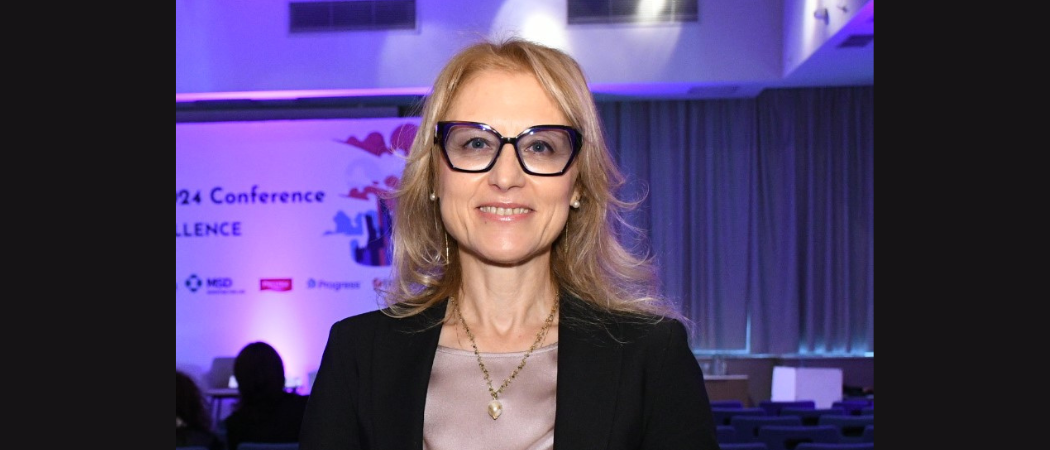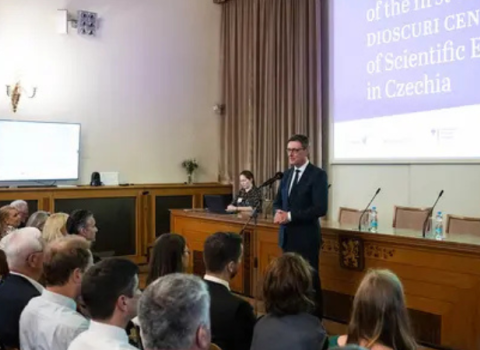Milena Stoycheva is an entrepreneur who in June 2023 was handed the keys to Bulgaria’s innovation ministry. She has set her sights on making the country a regional hub for high tech business and, in time, an innovation destination

Milena Stoycheva, Minister of Innovation and Growth in Bulgaria.
They say crisis breeds opportunity and Bulgaria’s minister of innovation and growth, a self-described ‘policypreneur’, is ready to seize it with both hands.
Milena Stoycheva was drafted into her position in June last year following a long period of political stasis. The country had been without a stable government for two years and had held five elections. The deadlock was broken when a system of rotating prime ministers was set up to satisfy opposing parties. A number of new faces were parachuted into government.
Stoycheva was one of them. She has a long background in working with start-ups, in Bulgaria and globally, and also worked at the European Institute of Innovation & Technology (EIT). Her appointment as minister was her first foray into politics proper.
That shapes her approach to the job, she says. “I accepted the job because […] I felt that I owed it to my country, to the ecosystem, to the talent here, to really try to rebrand Bulgaria as a place for innovation,” she told Science|Business. “But I will not change my character. I see myself more as a ‘policypreneur’
In practical terms, she means to see that the old approach which has left Bulgaria trailing behind most of its EU counterparts in innovation performance, is shaken off. “If we want to be innovative, all of the administration needs to change,” said Stoycheva. This means private companies embracing research and development, and the public sector embracing innovation. “It is pivotal for ministries to be the change agents,” she said.
Bulgaria’s innovation performance is the second lowest among EU member states, according to the European Innovation Scoreboard, ahead of only Romania. It is one of six EU countries classified as an ‘emerging innovator’, the scoreboard’s lowest classification of four.
Some of Bulgaria’s key weaknesses, as highlighted by the scoreboard, include a lack of government incentives or support for businesses to encourage private investment in R&D, and low public spending on R&D.
It means the country has a long way to go, but Stoycheva is ambitious. She believes Bulgaria can be a leading innovator in Europe but she her sights on positioning it as a leader among Europe’s central, south and eastern states.
Innovation pacts
Stoycheva’s ministry signed its first ever agreement with a foreign counterpart last October, agreeing a memorandum of understanding with Romania to work together on innovation, digitalisation, start-up development and research. More agreements are to follow, with a similar agreement with Greece close, and talks with Slovenia and Croatia in progress. Further afield partnerships with countries including Finland, Egypt, Georgia are also in the pipeline, said Stoycheva said.
“We are living in the era of partnerships and collaboration, and it is high time that Europe starts looking at the members not as competitors, but as collaborators,” she said.
Stoycheva is hoping to gather innovation ministers from Bulgaria’s near neighbours for a meeting in Sofia towards the end of April, to push the idea of strengthening the region’s innovation.
“I think we have a great opportunity to unite to [develop] a supply chain in some of these new highly technological and competitive emerging sectors to create a bigger common value proposition for Europe. We can boost European competitiveness,” she said.
But before Bulgaria can play host to neighbours and don its regional innovation leader status, it needs to get its own house in order. Stoycheva’s first task in government was to assess what factors are holding Bulgaria back. The challenge is not small. She points to red tape and regulation stymying start-ups and a lack of connection between the research and business worlds. In Bulgaria and Europe generally, there is too much “science for its own sake”, Stoycheva says. More needs to be done to translate research through to the market.
Bulgaria is working on forming a joint technology transfer fund with Romania and the European Investment Fund (EIF), creating a common pot of money to help commercialise products coming from universities. The model was established by Croatia, Slovenia and the EIF when they created the EU’s first ever multinational tech transfer platform in 2021, Central Eastern European Technology Transfer.
Bulgaria is also launching a pilot of an advisory programme to help support its start-ups in applying for European Innovation Council funding, through another joint partnership between the EIF and the European Investment Bank. Part of that package is an agreement between the EIB and United Bulgarian Bank to unlock financing of about €150 million for mid-cap companies.
For Bulgaria, a convergence of new appointments last year made it a perfect time to promote innovation. The country’s prime minister, Nikolay Denkov, is a member of the Academy of Sciences, deputy prime minister Mariya Gabriel is the former EU research commissioner, and her replacement in Brussels, Iliana Ivanova, is also Bulgarian.
However, just this week it was announced that Bulgaria’s idea of having a rotating prime minister system has broken down, meaning snap elections loom and political instability returns. After barely a year of promising steps, this latest political conflict could undo a lot of progress.
Whether Stoycheva foresaw this is not clear, but the innovation minister is looking far beyond the current political situation. The ministry has just launched an innovation board, comprising experts from Bulgaria and Europe, to help steer policies related to innovation. One of its first jobs is to help improve technology transfer in Bulgaria, but longer term Stoycheva said it is supposed to be a “living entity” with members swapping in and out and providing long term stability to the country’s innovation strategy to insulate it from political changes.
“I call this ministry the ministry for the future of Bulgaria,” Stoycheva said, who believes that innovation is the ultimate driver of growth, economic and societal change. “We have to think 20 to 30 years ahead. We need to look at what we need to do to position the country to be making smart investments in its future.”
Stoycheva knows the challenge of turning Bulgaria into a regional innovation leader, or even a Europe-wide leader, but it doesn’t daunt her. “We may be one of Europe’s hidden treasures as innovators,” she said. “We have lived through change and a lot of transitions, and this means we are much less risk averse than some of the more established economies. People are the drivers of growth, and we have all the prerequisites to be a much more interesting innovation destination.”





 A unique international forum for public research organisations and companies to connect their external engagement with strategic interests around their R&D system.
A unique international forum for public research organisations and companies to connect their external engagement with strategic interests around their R&D system.